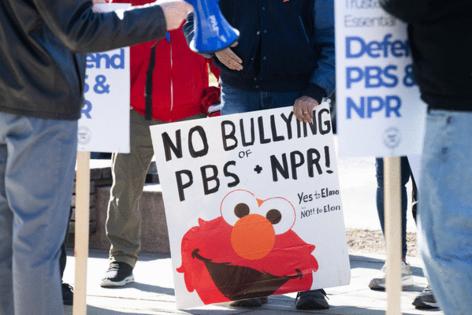Editorial: Congress, defend PBS. We knew you could
Published in Political News
"I'm very much concerned, as I know you are, about what's being delivered to our children in this country," said Fred Rogers to the U.S. Senate Subcommittee on Communications in May 1969. "We don't have to bop somebody over the head to ... make drama on the screen."
Public broadcasting, Rogers argued, was crucial because it cared about "trying to understand the inner needs of children" instead of just entertaining them — or seeking to turn them into customers — as most radio and television shows do.
He pointed out that his program's entire budget cost less than two minutes of cartoons. And today, federal support for public media amounts to less than $2 per American.
The children's television icon, whose eponymous program had debuted in the U.S. the previous year, was responding to threats from the Nixon administration to halve the budget for the recently created Corporation for Public Broadcasting. Fifty-six years later, another Republican president is threatening the future of public broadcasting in America, and should be similarly resisted.
President Donald Trump signed an executive order last week instructing the CPB to stop giving funds to both PBS and National Public Radio (NPR), which will affect over 1,500 public media institutions nationwide, claiming their programming was politically biased. These outlets are now much more enmeshed in American life, and much more important, than they were in 1969.
Public media systems reach 99% of the U.S. population, even people in rural communities who lack access to other services, such as broadband internet, while providing free education programs for youth as well as current affairs, science and arts programming. This makes these institutions essential not just culturally, but as a matter of public safety, including emergency preparedness.
CPB allocates over $500 million a year in federal funds to public media institutions around the country, providing essential support without which many of these outlets would cease to exist. In Pennsylvania, the corporation allocates $14.5 million, with $3 million going to Pittsburgh outlets WQED (radio and television) and WYEP, as well as $500,000 to Fred Rogers Productions.
Congress created the CPB as an independent nonprofit. It receives and distributes federal funds, but is not under the direct authority of the executive branch. The purpose of this arrangement was to keep public media institutions truly public — that is, funded by the public sector and therefore free from commercial incentives — while also preserving their independence from political forces.
As PBS put it in its own statement on the executive order, "In creating CPB, Congress expressly forbade 'any department, agency, officer, or employee of the United States to exercise any direction, supervision, or control over educational television or radio broadcasting, or over (CPB) or any of its grantees or contractors."
Trump's executive order came three days after he attempted to fire three members of the CPB board. The corporation is fighting this action in court, as well as the follow-up order. Both are direct attacks on the corporation's independence.
Besides being an attack on public media, this is also an attack on Congress, which created and funds CPB. Congress has appropriated funding to CPB through 2027. Members from both parties should protest this incursion on Congressional authority.
All Pennsylvanians benefit from public media. While CPB should prevail in court, local organizations, especially Pittsburgh's foundation community, should begin planning to support public media here, in case federal support evaporates. A gutted PBS will be very difficult to rebuild.
Defunding public media is the political equivalent of bopping someone over the head, just to make drama on screen. Something public broadcasting was never about.
_____
© 2025 the Pittsburgh Post-Gazette. Visit www.post-gazette.com. Distributed by Tribune Content Agency, LLC.




























































Comments